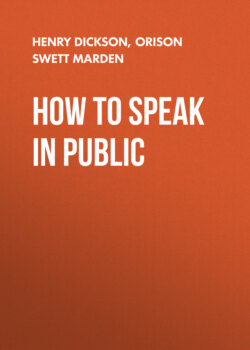Читать книгу HOW TO SPEAK IN PUBLIC - Henry Dickson - Страница 6
На сайте Литреса книга снята с продажи.
Abraham Lincoln and Stephen A. Douglas
ОглавлениеA writer has said: heard Abraham Lincoln and Stephen A. Douglas. The one six feet and four inches in height, the other hardly five feet four. The one awkward to the verge of grotesqueness, the other as dignified as Daniel Webster; Lincoln with a high pitched voice, Douglas with a basso profundo; Lincoln abounding in transitions, weirdly fascinating by his strange figure, postures and gestures, Douglas rarely departing from a dignified oratorical manner. Yet it was the declaration of arguments. He used no ornaments, was not verbose, was easily understood, possessed immense power of assertion, perfect coherence in argument, and wore the aspect of deep seriousness and sense of responsibility. He appeared to advantage in private life and was always ready to converse upon his principles and plans.
Douglas’ skill and power were attained by a careful study of great orations of the early days of the republic and British Parliament. When a judge of the Supreme Court he familiarized himself with decisions important for clearness of statement and strength of argument, and when he first took his seat in Congress he listened critically to the orators. He had the habit of invariably reflecting upon his own speeches after delivery, to ascertain by what means he succeeded, or to note why he failed or might have made a deeper impression.
Abraham Lincoln, with limited opportunities, disciplined and informed his mind while his body was strengthening and elongating, until intellectually and physically he was head and shoulders above his companions. His powers were developed by private arguments and off-hand speeches. Not, however, until he canvassed the State as a candidate for the Senate of the United States, with Stephen A. Douglas as his opponent, did his fame spread throughout the land. It was in his speech accepting his nomination that he spoke the following words, perhaps the most comprehensive, the most conservative, yet the most agitating ever uttered in the United States:
“A house divided against itself cannot stand. I believe this government cannot endure permanently half slave and half free. I do not expect the Union to be dissolved. I do not expect the house to fall; but, I do expect that it will cease to be divided. It will become all the one thing or all the other. Either the opponents of slavery will arrest the further spread of it, or its advocates will push it forward until it shall become alike lawful in all the States, old as well as new, North as well as South.”
